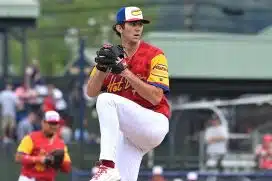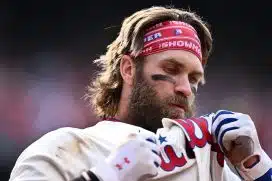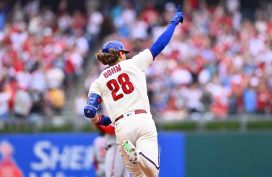By Tim Kelly, Sports Talk Philly editor
"There's people in baseball that don't think he'll make it out of his first Spring Training," a baseball source told SportsTalkPhilly.com – only half-joking – shortly after the Philadelphia Phillies announced Gabe Kapler as their 54th manager. Kapler, with rave reviews, made it out of his first Spring Training. However, a tumultuous first five games ended his honeymoon quickly. Kapler was unqualified to manage the Phillies and analytics were ruining baseball. Those were two takes heard during the first week of the 2018 season. An anonymous Phillie told Jon Heyman of FRS Sports after the first five games that the team would be fine, so long as "the manager got out of the way."
Things threatened to go off the rails rather quickly for Kapler. Forget what talking heads were saying about Kapler, or even that fans booed him when he was introduced at the team's home opener. When players start taking anonymous shots at the manager through the media, it's usually a good sign that the manager or coach has lost (or is losing) the team. Ask Chip Kelly. You can win back fans and radio hosts, but once you lose a clubhouse, there's almost no coming back from that.
So Pat Neshek, who returned to the Phillies on a two-year free-agent contract this past offseason, intervened. Neshek spoke to Bob Nightengale of USA Today, and said that while Kapler hadn't lost the clubhouse, players weren't on the same page as the first-year manager:
“It’s not like he lost the clubhouse. That didn’t happen,’’ Phillies veteran reliever Pat Neshek told USA TODAY Sports, “but there was just so much confusion.
“And there was anger. Nobody knew what was going on.
“A lot of guys were questioning him, like, “Is this how it’s going to be all year?’’
The most notable of Kapler's questionable early season decisions was pulling Aaron Nola on Opening Day after he had thrown just 68 pitches. Nola had allowed a double to Ender Inciarte to leadoff the sixth, but it was only the third hit he had given up. The Phillies had given their ace a five-run cushion to work with. Rather than allowing Nola to work through a double, Kapler pulled him and turned the ball over to his bullpen after Nola recorded one out, knowing that Neshek wasn't available that day. What ensued was an epic collapse from the Phillies bullpen.
Hoby Milner, who left-handed hitters had hit just .159 against in 2017, allowed a two-run home run to Freddie Freeman immediately after replacing Nola. The Braves tied the game in the eighth, partially thanks to a home run from Ozzie Albies, and partially thanks to a sloppy throw from Andrew Knapp in an attempt to throw out a basestealer at third base. In the bottom of the ninth, Hector Neris gave up a three-run walkoff home run to Nick Markakis, capping a disastrous managerial debut for Kapler.
The Phillies did win the second game of that series in extra innings, but that was quickly forgotten when the Braves chased Vince Velasquez early in the series finale, ultimately winning 15-2. Kapler, as noted by Nightengale, made 26 pitching changes in his first five games as a major league manager, including being forced to use utility-man Pedro Florimon to pitch in the 15-2 drubbing. This came after Kapler had called for Milner to come into the game earlier in the evening, only to realize that the since-optioned Milner wasn't even warming up in the bullpen.
Pitching changes at that frequent of a clip had maybe been made late in postseason series by progressive teams like the Dodgers. They hadn't been made in the first week of the regular season, probably for good reason. Neshek said he was frank in in this assessment when talking to Kapler:
“The games were being kind of run like a playoff atmosphere,’’ Neshek said. “Some guys were like, 'I don’t know if my body can take this.
"Nobody knew what was going on, but the games were being run a lot different than a regular-season game. We had to get on the right page or it was going to be a long season.’’
Neshek, a 10-year veteran, told Kapler he wanted to see him. It was April 1, an off-day in New York. Kapler offered to meet in the hotel bar. No, privacy was needed, Neshek said, and this was going to take a while. He emphasized that this isn’t the postseason, it’s the first games of a 162-game season. Sure, analytics are fine, but trust your eyes, follow your instincts.
To his credit, not only was Kapler willing to meet with Neshek – and the report says he ultimately met with other players – but he was willing to listen to any growing grievances. From that point on, Kapler and the clubhouse hit the reset button, allowing them to finish the month of April 15-10. As SportsRadio 94 WIP's Joe Giglio noted, Kapler went from being Vegas's early favorite for first manager to be fired to off the list entirely in just over half a month.
Some of that credit for that should go to veterans like Neshek, who worked to alleviate the situation, rather than piling on. That doesn't always happen in professional clubhouses/locker rooms. Neshek has spent nearly the entire season on the disabled list – with the exception of the now infamous first game – but it's evident how much the 2017 National League All-Star's voice is valued in Philadelphia.
On other hand, Kapler deserves credit for be willing to make adjustments. As I wrote this past offseason, he wasn't without his detractors in Los Angeles and around the sport. Those detractors were waiting to swarm the second that he showed any signs of being in over his head as a manager. To his credit, he blocked out the background noise, listened to his players and has gotten more conservative in his use of the bullpen, among other things. (The fact that the starting pitching has been pretty good since the first five games hasn't hurt either.)
For the many criticisms that there are of younger, more progressive managers, how they relate with their players seems to make more sense in today's game. While an older, more traditional manager may have looked at Neshek's request to talk as a sign of disrespect, Kapler was willing to sit down with Neshek (and apparently others.) Kapler is 42, Neshek, one of the clubhouse leaders, is 37. There's just a five-year age gap between the two, and the end of Kapler's career overlapped with the early part of Neshek's. So instead of the father-son relationship that many older managers have with their players, Kapler has created an environment where he's the oldest brother, willing to listen to the younger brothers. Apparently that relationship helped to keep it from being "a long season."







